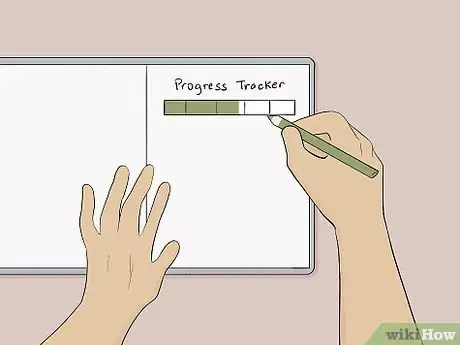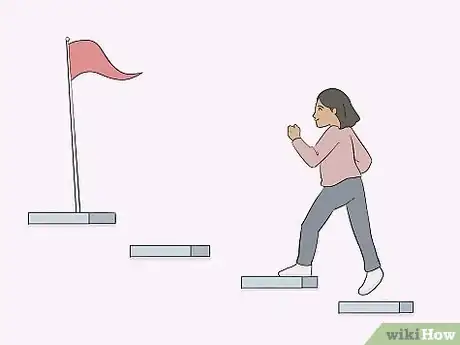This article was co-authored by Nicole Barile, PhD, NTP. Dr. Nicole Lippman-Barile is a Licensed Clinical Psychologist and a Nutritional Therapy Practitioner (NTP) who practices in New York. As a psychologist, she specializes in treating anxiety and mood disorders, Obsessive-Compulsive Disorder (OCD), and related compulsive disorders. As a nutritional therapist, Dr. Lippman-Barile specializes in treating blood sugar dysregulation, digestive health, and mood disorders related to food. She holds a PhD in Clinical Psychology from Hofstra University and a Nutritional Therapy Practitioner Certification from the Nutritional Therapy Association.
This article has been viewed 39,522 times.
People are generally brought up receiving validation from parents, teachers, bosses, and more. Occasionally wanting validation is normal and healthy, but seeking validation from others all the time can make you unhappy and insecure. Fortunately, it's totally possible to stop seeking approval from others and start appreciating yourself for who you are and what you have to bring to the world. Once you learn how to stop seeking approval from others, you'll feel more confident, and the only validation you'll need is from yourself.
Steps
-
1Develop a sense of self-worth. Be aware of your need to please others and refrain from giving in too easily. Pleasing other people should not be your sole purpose in life. Give yourself a break from this consistent source of stress and let go sometimes. Find your values and keep them in mind with your actions. Whatever you believe personally should guide your actions. You shouldn’t talk to one person and change your belief system, because that means you didn’t listen to your intuition.
- Don’t be afraid to express yourself. Be who you are and don’t be ashamed of it. Don’t hide behind a façade and limit your abilities by not allowing yourself to be heard or seen.
- If you feel awkward in some social situation, try to get out of your head and into the present moment. You can use some mindfulness tactics and try to normalize it.[1]
- If you think someone dislikes you, question the validity of those thoughts. It may not be true. The person may only have been annoyed at something you did.[2]
- It is best to remove those thoughts using mindfulness tactics. They can lead to more negative thoughts and emotions.
-
2Do more things independently. Go to more places alone to get used to being in a public atmosphere by yourself. Without others around, you can get a sense of what you would like to be doing as opposed to what others may wish for you to do. Refrain from thinking about what ‘others would think’ before just doing. Try to think for yourself and focus on your own emotions and thought processes to carry out your actions.
- Try to be confident in your own skin. Although this can be difficult at times, it doesn’t hurt to let yourself do things you normally wouldn’t to break out of your shell a little bit.
Advertisement -
3Focus on your good qualities. Make a list of the things you like about yourself and focus on them. A list can provide you with clear motivators for why you are perfectly capable as an individual. Be aware that your good qualities are present and abundant. Don’t focus heavily on the negative things about yourself. Everyone on Earth has negative qualities, focusing too much on them won’t get you very far. If you wish to improve, then set some goals, but don’t feel bad or like you aren’t good enough as you are.
- Understand that failure is not the end - you can always get better at doing something. Success doesn’t come easily, it requires multiple attempts sometimes, and usually hard work. Don’t beat yourself up over a failure.
-
4Be true to yourself. Don’t have unrealistic expectations for yourself. Although you should focus on the good qualities, that doesn’t mean you are ever going to be perfect. Being flawless isn’t something people are born with - recognize that and try to ingrain it into your daily thoughts. Not being flawless isn’t an excuse for horrible behavior, but it is something that humans live with on a daily basis.
- Don’t lie to yourself to make everything feel better. Lying to yourself is one of the worst ways to create a change. Understanding and recognizing your behavior and thoughts are the first step to changing some of them. Put things into perspective instead of asking for someone else’s opinion on the matter.
-
5Put yourself first. Don’t always say yes to people, be honest with them. If you don’t want to do something, speak up! People will understand and come around if they truly care about you. There is nothing wrong with making a choice that no one expects. Focus the majority of your actions on how they will benefit you in the future. Sometimes getting too caught up in how things will affect other people can cause issues within your own life. You need to put yourself first sometimes and take control of your own life before worrying about everyone else’s issues. Of course, don’t ignore other people’s issues, but just try to focus on your own first.
- Don’t get caught up thinking about what other people are doing constantly. A good way to stay consistent with this is to become a little busier. Spend your free time doing things you love or doing things productively. It’s hard to overanalyze other people’s lives when you’re so busy living your own.
-
6Focus on your passions. Think of a few different interests or hobbies you have and start working on those to manage your free time. Overthinking happens less often when your calendar is filled up with things you are looking forward to. Enjoy your time alone, and make it something to be cherished. Don’t feel like time alone is time wasted. Use that time to relax and wind down. This will help you distress and become more aligned with your own personal interests.
- Pick up a long-lost hobby or passion and get back into it. One of the best feelings is to regain a connection to something that has been lost and find a new joy in doing it once again.
-
7Keep track of your progress. Write a journal full of notes about how your progress goes. You can write down times when you figured out solutions to problems by yourself and how you tackled a tough situation alone. Or you can write down times you really wanted validation from someone else. This way, you’ll notice which types of situations make you want that validation, and which ones you are improving.
- Remember it’s difficult to change, but it is possible. Changing a mindset or a way of life is always a challenge, but know that you can get through this stage, and there is another one waiting for you. Continue to keep track of the things you are changing and how you’re changing them. This is very good to do, this way you can understand what works for you personally, and why it does. Continuing to use those methods is going to help immensely in the future.
-
8Stop comparing yourself to others. When you compare yourself to others, it isn’t doing anything productive. Everyone is incredibly unique and has their own abilities. People aren’t all a cookie cutter version and even incredibly successful people aren’t perfect. Someone else could be very good at something you are not, but you might be very good at another thing they can’t do.
- Don’t focus on why people are better in certain ways, but rather think about what you want to feel and how to get there. Again, the most important thing is your own success and emotional stability, try to focus on those concepts instead of what other people have going for them. Be grateful for what you already have and don’t continue to focus all your energy on what you don’t have.
-
9Set goals for yourself. Don’t live to please others, but live to please yourself instead. Still consider other people’s perspectives, but don’t focus entirely on them. Make a list of your attainable goals and make sure they are things you want to do. Setting goals is important so you know specifically how you are going to make this change and why as well. Try to follow through with these goals, as doing so can bring happiness. Know the reason, it should be because you deep down desire this change within you.
-
10Begin living for yourself. It is okay to be a little selfish sometimes. After all, it’s your life. Be who you are and be proud of it, there is nothing wrong with doing that. Try new things you’ve always wanted to do. Give yourself some things to look forward to and make plans to do more fun things! Don’t rely too heavily on other people around you. People are a great source of information and comfort, but relying on them too often can become draining and make you feel as though you can’t do anything properly yourself.






































































